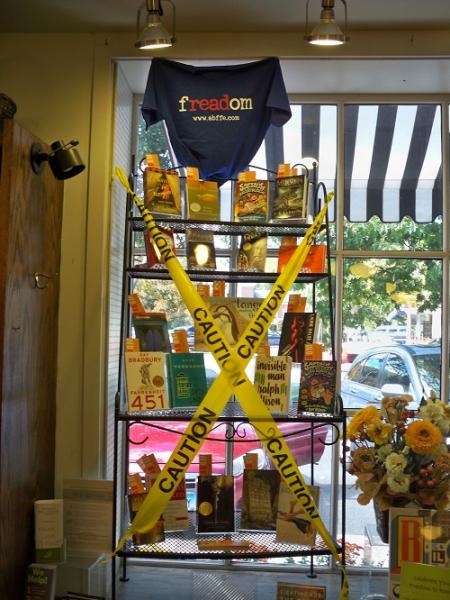- Categories:
Banned Books Week 2013: Another Success
Conversations about censorship and First Amendment rights filled indie bookstores across the country during last week’s celebration of the 31st annual Banned Books Week.
At Housing Works Bookstore Cafe in New York City, the focus was on banned poetry. With the help of the American Booksellers Foundation for Free Expression (ABFFE), Housing Works hosted “Paradise Banned,” an event featuring 10 modern poets reading the works of others whose poems have been banned at different times throughout history. Poems by Allen Ginsberg, Walt Whitman, Marina Tsvetaeva, Frank O’Hara, Daniil Kharms, and Sappho were read by the likes of Timothy Donnelly, Deborah Landau, Alex Dimitrov, Monica Ferrell, Matvei Yankelevich, Claire Donato, Aimee Herman, Phil Fried, and Ana Bozicevic. The event was well attended, said Amanda Bullock, Housing Work’s director of public programming, with nearly 100 people in the store for the event. Beer and wine was provided by ABFFE.
“People seemed to be really into it, and I liked that we were able to bring poetry to the forefront,” said Bullock, adding that while many people know about the history and influence of Allen Ginsberg’s Howl, the stories of many other poems and poets are often unknown.
Housing Works also had a prominent display of banned books, which prompted a lot of in-store conversation.
“I think that it’s very important that independent bookstores celebrate Banned Books Week, just because of that word ‘independent,’” said Bullock. “We’re in that unique position to shed light on things like this, and have done it throughout history.” As a nonprofit organization with the mission to end homelessness and AIDS, partnering with another nonprofit such as ABFFE to bring attention to censorship was a good fit, said Bullock. Noting that indie bookstores and libraries have always had an obligation to educate their communities, she added, “People come to us for information, so it’s important we follow through.”
In Washington Depot, Connecticut, Hickory Stick Bookshop hosted a read-out from banned books by members of the local community. The store also created a banned books display and promoted banned titles via its website.
 “Many customers were drawn to the display by the caution tape,” said bookseller Pat Moody, who overheard questions such as “Are books really banned?” and “Why is this book banned?” Other customers found that they wanted to read some of the books that were on display.
“Many customers were drawn to the display by the caution tape,” said bookseller Pat Moody, who overheard questions such as “Are books really banned?” and “Why is this book banned?” Other customers found that they wanted to read some of the books that were on display.
“Indies are a perfect venue to engage customers in conversations to remind people that everyone has a right to choose what to read and that censorship is still a problem even in this modern age,” said Moody. “Censorship doesn’t protect us, it handicaps us.”
Several bookstores around the country worked with the Media Law Resource Center (MLRC) to host events on censorship featuring a media lawyer and/or a reporter.
Once such store was Vroman’s Bookstore in Pasadena, California, which worked with MLRC to coordinate an event with Greg Nylen, a Los Angeles-area lawyer specializing in copyrights and trademarks. Nylen’s presentation on censorship “led to a very lively discussion” among all in attendance, said Vroman’s digital media coordinator, Rachel Ormiston.
As in years past, Vroman’s set up Banned Books Week displays in the children’s department and on the main floor with shelf-talkers that explained when, where, and why a book was banned. “The displays always spark a bit of discussion,” said Ormiston, “especially since a lot of the titles are mainstream now and many customers –– and even booksellers –– are surprised by some of the titles included.”
Booksellers wore ABFFE stickers and buttons bearing the slogans “fREADom,” “I sell banned books,” and “I read banned books,” which “also functioned as a way to start conversation with customers when they asked about what those books might be,” said Ormiston, adding that Vroman’s has noticed a few banned titles making an appearance on the store’s bestsellers lists as a result of its Banned Books Week efforts.
“Banned Books Week is an excellent way to start conversations about what it means to censor books and how this censorship affects readers and authors,” Ormiston continued. Bookstores make for “great venues to open a discussion that we often don’t consider… many of us take our freedom to read for granted!”
There were many bookstores that posted banned book read-out videos to ABFFE’s YouTube channel this year, and among them was the UConn Co-op in Storrs, Connecticut, whose video featured Susan Herbst, the University of Connecticut’s president, reading from Persepolis.

